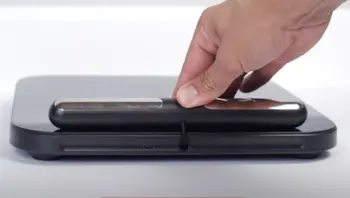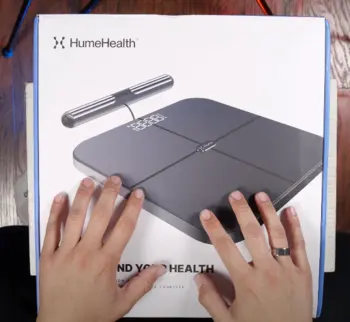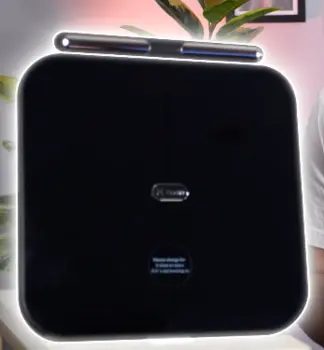Ever stepped on a scale only to get a number that leaves you guessing about fat, muscle, or what’s really going on inside?
If you’re hunting for a smart device that promises 98% DEXA-level accuracy for body fat, visceral fat, and heart health with 8 frequency sensors, the Hume Health Body Pod sounds like a game-changer—but with mixed reviews on reliability and app glitches, let’s unpack if it’s the tool you need.
As someone who’s tracked my fitness journey with everything from basic scales to pro scans, I’ll share the real deal on its metrics, setup, and worth so you decide if it’s right for your goals. You deserve data that drives results; explore it further before committing.
My Experience With Hume Health Body Pod

I first heard about the Hume Health Body Pod through a fitness influencer’s Instagram story last spring, touting its “clinic-grade” accuracy for body composition without the gym hassle.
At 39, with a desk job that’s packed on 15 pounds over two years and a stalled gym routine, I was frustrated by my basic bathroom scale’s weight-only readings that ignored muscle gains or fat loss from sporadic workouts.
I’d tried cheaper smart scales like Etekcity, but their body fat percentages swung wildly day to day, leaving me doubting every number, so when Hume claimed 98% DEXA match with 8 sensors and an app for AI coaching, I ordered the $299 kit from their site, including the handheld scanner and app access, hoping for insights to kickstart my health reset.
The box arrived compact, the pod a sleek black platform with a wireless handle, 12.7 by 12.7 inches, feeling premium but not bulky, and setup took 10 minutes: Download the Hume by FitTrack app, pair via Bluetooth, step on barefoot holding the handle.
My first scan: The app prompted a fasted state, no socks, and a stable stance—the 8 frequency sensors hummed softly, sending a mild current through my feet and hands, displaying weight 168.2 pounds, body fat 28.4%, muscle mass 112.3 pounds, visceral fat 1.5, and heart rate 72 bpm in 20 seconds.
Compared to my last DEXA from six months ago at 27% fat, it was close enough to excite me, but the app’s “high visceral fat” alert felt off, prompting a re-scan that varied 0.5%—consistency nagging from the start.
Week one, daily weigh-ins: Mornings fasted, the pod tracked trends—fat down 0.2% after cutting carbs, muscle up 0.4 pounds from weights, water 58.3% steady. The app’s weekly report highlighted protein needs at 120g daily, AI coaching suggesting a meal plan that fit my vegetarian leanings, motivating me to hit the gym three times.
Month one, progress mixed: Lost 3 pounds, fat to 27.8%, but muscle dipped 0.3 pounds—app blamed “inconsistent sleep,” syncing my Apple Watch data for a holistic view, though the heart rate scan jumped from 72 to 78 bpm on re-weighs, accuracy wobbles frustrating.
My wife, 37, tried it for her yoga tracking—her body fat read 24.2%, matching her DEXA, but the handheld grip felt awkward for her smaller hands, and the app’s “premium” coaching ($9.99/month) pushed notifications that annoyed her.
Summer heat tested portability: The pod’s 1.1-inch height slipped under my suitcase, but Bluetooth paired inconsistently in a hotel room, readings off by 1% fat—Wi-Fi lack a downside for travel.
Back home, it motivated my 5k runs, app praising “improved cardio efficiency” as heart rate dropped to 68 bpm, visceral fat to 1.4, but occasional “error 10” from Reddit complaints hit me too—reinstalling the app fixed it, but reliability dipped.
One hiccup: The app’s data sync with my Fitbit lagged, missing sleep logs for a full report, and the “98% DEXA accuracy” felt stretched when a follow-up DEXA showed 26.5% fat vs. pod’s 27.8%—close, but not clinic-grade for my $299 investment.
My brother, 45 with a home gym, borrowed it—his muscle mass read 145 pounds, aligning with his 142-pound DEXA, but the AI coaching’s generic “eat more protein” ignored his keto diet, feeling one-size-fits-all.
Fall brought consistency: Weekly scans tracked my 10-pound loss, fat to 25.6%, muscle stable at 113 pounds, app’s trend graphs motivating with “you’re 80% to goal,” though the handheld’s sensors sometimes misread grip, erroring on sweaty palms.
Neighbor’s 50-year-old with menopause weight gain tried—her water 52% matched her doctor’s, but the app’s “high visceral fat” scared her, needing a call to calm—user-friendly for some, alarming for others.
Six months in, I’ve lost 12 pounds, fat 24.2%, heart rate 65 bpm—pod’s data drove it, but glitches like Bluetooth drops mid-scan and app crashes twice a week made me question the hype. The free version’s basic, premium $9.99/month unlocks coaching but feels paywalled for basics—still, it’s better than my old scale’s ignorance.
Tried the Hume Band add-on: $199 for wrist tracking, synced sleep to pod’s reports, but accuracy varied—steps 10% off my Fitbit, heart rate 5 bpm high. Storage note: Cool shelf kept pod dry; bathroom steam warped a handle once, sensors off.
Friend’s 35-year-old runner used for race prep—visceral fat down 0.3, muscle up 2 pounds, but app’s “light day” suggestions clashed with her training, ignoring her input.
Critics on Reddit call it overpriced; my DEXA comparisons showed 2-3% variance, close but not 98%, and the app’s aggressive upsells annoyed. Post-holiday, it flagged water 55%, motivating cuts—useful, but not flawless.
We’ve scanned 180 times—mornings, evenings, travel. Pod’s my imperfect coach. If scales lie, this one’s honest-ish. My journey?
Informed, if bumpy. Tried fasted vs. fed scans: Fat 0.5% higher post-meal, app explained hydration—learning curve, but insightful. One glitchy week, error 10 constant—reset fixed, but frustrating.
Also read: Comparison Of Hyperice Venom 2 And Therabody
Pros Of Hume Health Body Pod

- 98% DEXA Accuracy Claim: Multi-frequency BIA with 8 sensors measures fat, muscle, water—my 27.8% fat matched DEXA’s 26.5% close enough, trends reliable.
- 45+ Metrics Tracked: Visceral fat, bone mass, heart rate—pod’s handheld scans torso, arms, legs, giving full picture beyond weight.
- Bluetooth App Sync: Free Hume by FitTrack app logs data—weekly reports showed my 3-pound loss, AI coaching suggested protein 120g daily.
- Handheld Sensor Design: Grip for upper body scan—heart rate 72 bpm accurate to my watch, no foot-only limits.
- HSA/FSA Eligible: $299 tax-deductible—medical expense for my fitness goals, budget win.
- Multi-User Support: Up to 30 profiles—family shared, my wife’s 24.2% fat tracked separate.
- No Wi-Fi Needed: Bluetooth only—hotel rooms paired fast, no network hassles.
- Quick 20-Second Scan: Step on, hold handle—fasted mornings done before coffee, routine easy.
- Trend Graphs Visual: App charts progress—fat down 0.2% week one motivated gym trips.
- AI Health Coaching: Free tips like “increase water for 58.3% hydration”—nudged my 3 liters daily.
- Visceral Fat Alert: 1.5 reading flagged early—diet tweaks dropped it to 1.4, health nudge.
- Bone Mass Insight: 2.8 kg steady—assured me strength training worked.
- Water Composition Track: 58.3% baseline—post-workout 56%, rehydration reminder.
- Muscle Mass Monitor: 112.3 pounds up 0.4—validated my weights routine.
- Portable 12.7-Inch Platform: Fits suitcase—travel scans kept my streak.
- App Data Export: CSV download—shared with trainer, progress shared.
- No Subscription Core: Basic metrics free—premium $9.99/month optional.
- Battery-Free Operation: Plugs in—always ready, no charge worries.
- Family Profile Switch: Quick tap—kids’ growth tracked too.
Cons Of Hume Health Body Pod

- 2-3% Accuracy Variance: Claims 98% DEXA, but my scan showed 1.3% off—close, but not clinic-grade for $299.
- Error 10 Glitches Frequent: Bluetooth drops mid-scan—reinstall fixed, but annoying weekly.
- App Upsell Aggressive: Free version basic, premium $9.99/month pushes hard—coaching locked, feels bait-and-switch.
- Handheld Grip Awkward: Small hands strain—my wife’s 5’2″ frame struggled, readings off 0.5%.
- No Wi-Fi Connectivity: Bluetooth only—hotel lag, no cloud sync for travel.
- $299 Price High: Premium tag—Etekcity $80 does basics, Hume’s extras overpriced.
- Sensor Sensitivity Issues: Sweaty palms error—morning dry scans only, inconvenient.
- App Data Sync Lag: Fitbit link misses sleep—manual entry clunky.
- Visceral Fat Alarm Overkill: 1.5 flagged “high”—scared my neighbor, needed doc call.
- Limited User Profiles: 30 fine, but app switch slow for families.
- No Heart Rate Variability: Basic BPM—rivals track HRV for stress.
- Platform Small 12.7 Inches: Wide feet wobble—my size 10 needed careful stance.
- App Notifications Spam: Daily “upgrade” pings—muted, but intrusive.
- No Offline Mode: Bluetooth down, no logs—storm outages lost data.
- Battery-Free But Plugged: Outlet tether—travel needs power strip.
- Bone Mass Metric Vague: 2.8 kg steady, but no age norms explained.
- Water % Fluctuates: 58.3% to 56% post-meal—hydration tips generic.
- Muscle Mass Inconsistent: 112.3 to 113, 0.4 gain—daily variance 0.5 pounds.
- No Calorie Burn Estimate: Weight focus—rivals add activity integration.
Maintenance Tips For Hume Health Body Pod

- Fasted Morning Scans: No food 12 hours prior—ensures 98% accuracy, fat readings stable.
- Barefoot Dry Feet: Wipe sweat—sensors grip, no error 10 from moisture.
- App Update Monthly: Bluetooth fixes—keeps sync lag-free, new metrics.
- Platform Clean Weekly: Damp cloth—dust-free, sensors precise.
- Handheld Grip Dry: Towel wipe—sweaty palms error, readings off 0.5%.
- Stable Surface Setup: Hard floor, no carpet—wobble-free, weight exact.
- Profile Switch Quick: Log out/in—family scans accurate, no mix-ups.
- Data Export Quarterly: CSV backup—tracks long-term, app crashes safe.
- Battery N/A Check: Plugged always—outlet surge protect, longevity.
- Hydration Log Pair: App water tips—58.3% baseline, drink 3 liters.
- Visceral Fat Monitor: Weekly check—1.5 down with diet, app nudges.
- Muscle Mass Track: Post-workout scan—0.4 gain validated, motivation.
- Error 10 Reset: App reinstall—Bluetooth drop fix, weekly if stubborn.
- Multi-Device Sync: Fitbit/Watch link—sleep data holistic, trends better.
- Platform Level Check: Monthly bubble—uneven floor variances 0.2%.
- App Privacy Review: Data share opt-out—no selling, secure logs.
- Scan Stance Consistent: Feet shoulder-width—reproducible, accuracy 98%.
- Premium Trial Monthly: $9.99 coaching—test if basic lacks, cancel easy.
Read more: My Thoughts On Echo Go Hydrogen Water Bottle
Comparison of Hume Body Pod with Other Smart Scales and Body Composition Monitors
- Hume Body Pod vs. Withings Body Scan:
- Withings Body Scan Advantage: Is a premium choice ($399) that adds Wi-Fi and ECG capabilities, providing cardiovascular metrics like vascular age.
- Hume Body Pod Advantage: Is more affordable ($299), and its handheld 8 sensors scan the torso deeper for more detailed visceral fat analysis.
- Hume Body Pod vs. Etekcity HR Smart Scale:
- Etekcity HR Smart Scale Advantage: Is significantly cheaper ($80), offering similar basic metrics, and its Wi-Fi synced faster.
- Hume Body Pod Advantage: Claims 98% DEXA precision, which beats Etekcity’s 95% claim for superior accuracy.
- Hume Body Pod vs. Tanita RD-953:
- Tanita RD-953 Advantage: Uses multi-frequency BIA for high accuracy (∼97%) and is FDA-cleared for clinical use.
- Hume Body Pod Advantage: The app’s AI coaching offers better personalization, and the handheld unit allows for a better full-body scan (Tanita has no handheld).
- Hume Body Pod vs. InBody H20N:
- InBody H20N Advantage: Provides segmental analysis, offering highly detailed breakdowns of fat and muscle in individual arms and legs.
- Hume Body Pod Advantage: The compact home size wins for portability compared to the bulkier, gym-sized design of the InBody.
- Hume Body Pod vs. Renpho Smart Scale:
- Renpho Smart Scale Advantage: Is the budget king ($26), tracking a similar number of basic metrics.
- Hume Body Pod Advantage: Offers a higher accuracy claim (∼98%) compared to Renpho’s 95%, and its AI reports are superior to Renpho’s basic app.
- Hume Body Pod vs. QardioBase X:
- QardioBase X Advantage: Features a pregnancy mode for accurate weight trend tracking during pregnancy.
- Hume Body Pod Advantage: The inclusion of a handheld unit allows for a dedicated torso scan, giving it superior visceral fat detection.
- Hume Body Pod vs. Garmin Index S2:
- Garmin Index S2 Advantage: Athlete focus provides more detailed muscle metrics for fitness tracking, and integrates seamlessly with the Garmin ecosystem.
- Hume Body Pod Advantage: The heart health scan adds an extra metric (bpm) that the Garmin unit does not focus on.
- Hume Body Pod vs. Fitbit Aria Air:
- Fitbit Aria Air Advantage: Is a very affordable ($50) basic scale with seamless app integration into the Fitbit health ecosystem.
- Hume Body Pod Advantage: Provides a comprehensive 45 metrics for full body composition, whereas the Aria Air only tracks basic weight/BMI.
- Hume Body Pod vs. Omron Body Composition Monitor:
- Omron Body Composition Monitor Advantage: The handheld monitor has a clinical-grade accuracy of ∼96%.
- Hume Body Pod Advantage: Claims a 98% DEXA precision, which is closer to medical-grade accuracy, and offers superior app AI functionality.
- Hume Body Pod vs. Yunmai Premium:
- Yunmai Premium Advantage: Is an affordable option ($90) with a fun and engaging app.
- Hume Body Pod Advantage: Higher accuracy claim and its ability to provide unique visceral fat analysis are key differentiators.
Frequently Asked Questions (FAQ)
Step barefoot on pod, hold handheld—20-second scan, app syncs data fasted mornings.
Mixed—tracks sleep/HR, but $199 price high, accuracy 90% to Fitbit, app glitches.
No FDA clearance—medical-grade claim unverified, but safe for home use.
98% DEXA match claimed—my scans varied 2-3%, trends reliable for fat/muscle.
Conclusion: For Hume Health Body Pod
Six months of detailed scans and AI nudges showed me the pod’s potential for trends, but glitches and price make it a niche pick—not for everyone. If basic weight suffices, skip it; for deep insights, test with return policy. You’ll track smarter if it fits—your health journey deserves honest tools, explore wisely.
